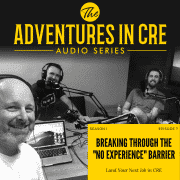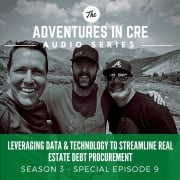Making the Career Transition into CRE featuring Caleb Staub
This episode of the A.CRE Audio Series features Caleb Staub, who is making a transition from active duty military service to the commercial real estate industry. He sits down with Michael, Spencer and Sam, who provide insights applicable to anyone currently seeking to make the leap from vastly different industries into commercial real estate.
A big thanks to Caleb for making himself and his story available to our viewers!
Making the Career Transition into CRE featuring Caleb Staub
Or Listen to this Episode
Resources from this Episode
Episode Transcript
Announcer (00:01):
Welcome to The Adventures In CRE Audio Series, join Michael Belasco and Spencer Burton as they pull back the curtain on everything commercial real estate, and introduce you to some of the top minds in the industry. If you want to take your skills to the next level, and be part of a growing community of CRE professionals across the world, this is for you.
Sam Carlson (00:25):
All right. Welcome back to The Adventures In CRE podcast. We’re excited to have you here today. We’ve got a good one for you today. We’re going to be talking about how to transition into CRE, and I know a lot of people transition into commercial real estate from all sorts of different professions. Today’s guest, Caleb Staub is going to be, I think a pretty interesting discussion on how to do that as well as maybe a little bit of insight into maybe why, and some of those cool questions. So to get us started, I’m going to turn it over to Spencer Burton, and we will get going.
Spencer Burton (01:01):
Thanks, Sam, and Caleb, it’s really nice to have you on. We asked Caleb to join us today. He’s in a very unique position where he’s still in his current profession. He’s in the military and special forces, I think has roughly a year left to complete his service, and then will be transitioning into real estate. And during that time, and I’m stepping a little bit on your message Caleb, but over the past few years, he’s completed a master’s in real estate at Georgetown University. He is a graduate of our accelerator real estate financial modeling training program, but he’s very much in this transition phase.
Spencer Burton (01:43):
And oftentimes we speak with individuals who have already gone through it, but it’s I think equally valuable to speak with individuals who are in the midst of it. And part of it can be Michael, Sam, and I are offering advice and thoughts on where you are Caleb, currently. Learn from you, and what you’re discovering some of the challenges that you’re getting. So that ultimately those who are listening, and are in this process of transitioning into real estate, might get something of value out. So, maybe to start Caleb, why don’t you share with the audience, just a couple seconds who you are? What you’re doing? What you’re… And maybe even the reason why you’re transitioning into real estate?
Caleb Staub (02:26):
Sure. I can give it a little bit of background. Before I was in the military, I went to Marcus school of engineering and actually got two degrees in architectural engineering, construction management. So I’ve always had… I was into the built environment if you will, or learning about it, whether it’s from the engineering perspective or the construction perspective. And I actually worked, pursued, a role in construction project management for about two or three years, and then right before I was about to graduate, I decided… I always had the feeling in the back of my head that I wanted to join the military, but with going to college, that just kind of delayed it. And then once I kind of got closer to that graduation point, made the decision to join the military. And that’s where I’ve been for about six years, and it’ll be about eight years when I get out.
Caleb Staub (03:28):
But the reason why I made that decision, transition, it was kind of a two-part decision. When I met… I met my wife while in the military and obviously military life isn’t conducive to a great family life. You’re gone a lot and just, it’s just hard on the family. So it was… I can’t do this for the rest of my life and it’s important for them.
Caleb Staub (03:56):
So it’s like, what am I going to, what am I going to do? And so then I started kind of researching what are my options like after I get out of the military. And I kind of read a couple books that I guess changed my perspective on how I view earning money or a career and Rich Dad, Poor Dad was the first one and then Richest Man in Babylon. And I kind of changed my perspective on investing your money and having your money work for you. So I didn’t know much about the real estate business side or that aspect. So I made a decision to get my master’s degree so I could learn as much as I could about that specifically. And then moved down to the accelerator course.
Spencer Burton (04:46):
You know, what’s funny. I’m sorry, go ahead, Sam.
Sam Carlson (04:49):
Sorry to interrupt you real quick. What’s funny about that is those were the exact two books that I read; the first two books that I read at the very beginning of my career too. When my wife and I first got married, I married into a family, and at the reception, I was like, what do they call that? At the reception, my new cousin-in-law gave me this book, Rich Dad, Poor Dad. And I never heard him like, what is this? I got that book. And then, I don’t remember… I want to say actually, I don’t remember where I heard about The Richest Man in Babylon, but what’s really cool about that book is I probably… I try and read it like once a year, because first of all, did you read it or listen to it?
Caleb Staub (05:33):
I read it.
Sam Carlson (05:34):
If you ever want… It’s fun, the guy who reads it, the actual narrator, he’s got a really interesting voice, just the way he reads it. And it’s fun… My kids love to listen to that book. So anyway, like you said, it’s an awesome parable, really cool foundational principles for building, whether it’s your own business or your career, just really good stuff. And I think you’re right, I think it does a lot just for perspective, maybe when you started your career is more focused on, Hey, I’m going to do the military thing, but then just like you, it, it did, it opened my mind up to possibilities. You know, what else could I do? Like what, what other cool things. So that’s really interesting that you pinpointed those two exact books.
Spencer Burton (06:18):
Yeah. And that’s interesting, as you were looking at a clear transition that was coming in your life, and in your case, it’s a forced transition, right? You’re coming to the end of your military service. For many it’s a forced transition. Maybe they’re coming from other industries or in marketing or whatever the fourth transition is, they hate what they do. They realize they’re in the wrong place and you clearly enjoy what you do. And it’s a great service to our country. But for many people they’re transitioning because they just don’t want to do it anymore. And many start by reading books that plant seeds. What was it about those books that planted the seed? And I guess the seed already been planted from grad school, but what is it about those books that really kind of orientated you towards real estate?
Caleb Staub (07:05):
Well, to take a step back. When I, when I was making the decision to transition out of the military, that “the why?” Was because of the family, but then I started thinking, how am I going to make this work? What am I going to do to provide for my family? So that’s when I started researching and reading as much as I could, different business books. And that’s where I landed on those two specifically. And I guess why that resonated with me specifically, is just, it changed my perspective on how to make money. It’s a… For me, it was always like, you’re exchanging your time for a paycheck. And then when I read those books, it’s more taking that money and making it work for you. So you’re not just giving that time… Because at the end of the day, my time is what’s most important with my family. So “how could I maximize that time?” is what basically resonated with me, and those books kind of helped change that perspective.
Michael Belasco (08:10):
So what’s interesting is that, a lot of people will read those books, and if you’re wanting to get into real estate, it could be residential. It could be commercial. A lot of people end up going out and trying to buy a duplex or just trying to dive into it. And then there are others who say, “okay, I’m looking at a much bigger picture here and I’m going to plot a course out”. And so I actually know that there’s a lot, I don’t know. And I’m going to take some steps in order to prepare. And it seems like you went down that path, watching what you’ve done, obviously you went and you decided, okay, I’m getting the message, but that’s not enough. I’m not just going to go out and try to find cash and buy a duplex. I actually want to master this subject. I’m going to go get my master’s degree. I’m going to take the accelerator. I’m going to do all these things that help prepare me.
Michael Belasco (08:53):
What in your mind, after you read those books… Why choose to go back for more education rather than just dive in at that time? What was your thought process there?
Caleb Staub (09:08):
Well, I had the resources to expand my education. So it was easy to make that decision. But then at the same time I just didn’t want to dive in. I wanted to… I’m much more of a planner. I like to figure things out and then kind of set a course. And like you said, make a plan before just jumping into something. That’s kind of how I operate. And so it made sense for me to learn about this industry as much as possible before I just jumped in.
Michael Belasco (09:45):
I was going to say a lot of… We say this a lot, when we talk to different universities, it’s particularly undergrads is when you’re making this transition grad school is like the big opportunity. You can position yourself to transition from any industry, and taking that step in grad school at the right grad school will elevate you not only to just get in the game and be able to go out and buy real estate, but really puts you in a position to become a leader in the industry. So it’s a great path and a common path for a lot of people to decide “okay, I understand where I want to go. Now let me go become an expert and figure out the best way to transition”. So going back to grad school helps, obviously, your networking and helps you get really sophisticated and become incredibly intelligent in the area you’re trying to succeed in. So it’s a really good message, I think, the path that you took with…
Sam Carlson (10:35):
And if we could go back for just a minute to The Richest Man in Babylon. I don’t want to spend all the time for the podcast dwelling on this book, but I kind of feel like there’s… So there’s one principle in there that I think is, “invest with those who know”, right? And I think it’s, “invest in areas where you have expertise or invest with those you know”, that’s one of the principles. Okay. And it also says, “invest your accumulated capital into gaining the compounding of interest”.
Caleb Staub (11:06):
Mm-hmm.
Sam Carlson (11:07):
Okay? Which if you take those two principles in and of themselves… A career in commercial real estate is.. That’s the foundation of the house that you’re building. Those two things. Is learning how to become the expert. Okay? And then learning how to invest capital that gains interest that compounds. So I just think it’s funny because… I mean, I think it’s very natural. These are principles that you learned and it’s like, where’s the most natural fit? Commercial real estate I think is right there.
Spencer Burton (11:43):
I love that. I had a call this morning, Michael and I do these fairly often where kind of young professionals or professionals, such as Caleb, that are transitioning into the industry, trying to break in and have calls. And these particular individuals are already in the industry, but trying to move from brokerage into private equity and part of that conversation, I always ask, “Hey, where do you want to be 10, 15 years from now?” I will tell you almost universally years and years of these conversations, hundreds of these conversations, almost universally, there’s an entrepreneurial interest long-term for individuals to get into commercial real estate. And what I’ve found is whether you’re an employee working for a real estate firm, or you’re out on your own, you’re essentially doing the same thing. You’re working to make capital grow. And in fact, as you grow with an organization, if you chart a route that is a purely, “I’m going to work for a real estate firm for my entire career”. At a certain point in your career, a good share of your compensation actually is promote. And promote is essentially ownership.
Spencer Burton (12:55):
And so whether you work for someone, you’re on your own, at the end of the day, you’re working for yourself and you’re working to… Your hours are compounded or leveraged in a way that you make x, 10 x, what the number of hours you’re putting in because you’re working in this sort of asset type. It’s a fun, exciting industry. And that really… Like your message Caleb of reading those books really resonated with me. So let me, let me get back to kind of some structure around the advice. The first piece of advice I think is clear is learn the skill. It’s just not a matter of saying, “I want to get into the industry”, learn it. And, and Caleb is a great example of that going to a phenomenal grad school and learning real estate, taking other courses, such as the accelerator.
Spencer Burton (13:49):
The second piece of advice, Caleb, and this is directly to you. And I would imagine you’re already taking this on part of why we’re doing this is Caleb reached out asking, “Hey, let’s talk about this transition” is network. So the skills are great, but real estate is very much a people business. And you find opportunities whether career opportunities or deal investment opportunities largely through your network. And so Caleb to you, I guess the first question is what networking activities, if any, are you doing right now? How are you finding people who are in the industry when you’re not in the industry yet?
Caleb Staub (14:36):
Yeah. So it’s crazy how much value networking can bring, because going through all the programs at school, you get all the theory, the background information, the knowledge, but then in my head, I’m trying to figure out how do I piece this together to make it work for me. And I don’t exactly, right now, know maybe what that answer is. But when I… I have been to events where you’ll talk to somebody and they… Like the other day, there is a crowdfunding resource that’s specifically for veterans. And they work with entrepreneurs, whether they’re trying to sponsor real estate or get startup capital. So it’s like, oh, that’s a way I can get capital to do a deal. “Okay. So what’s my next step? What do I do next?” So just having those conversations and kind of meeting new people, seeing what they offer, what they bring to the table and then how you can help them and kind of have a mutual relationship. Without that networking, I would’ve never got to that position.
Sam Carlson (15:51):
You know, it’s interesting because every person that gets into whatever niche it is, whatever industry it is rather; commercial real estate, obviously included in that conversation, brings to the table specific background, set of skills and things along those lines. And, I’d be curious as you look at training in the military, including special forces, which you’ve been through a lot of training there. What are the skills at? I mean, I can think of a couple, but I’d guess I’m wondering from your perspective, what are some of those skills that you feel are going to, you’re going to say, Hey, I’m going to take what I’ve learned through my career in the military and apply those to this industry in commercial real estate. Are there some that kind of leaped to the forefront of your mind?
Caleb Staub (16:45):
Yeah. I’ll say two specifically. And the first one would be working with different types of people, different personalities, different backgrounds, and then trying to solve a common problem. That can be translated anywhere. Like in the military, you’re working with different organizations, different branches, whatever. And so you have a common goal, you’re given a problem and you’ve got to work together. And that’s important in any position or role, I would say. The second one very often throughout my military career, you’d have somebody superior, my manager, if you will, drop a problem on your plate and be like, here’s your left and right. Figure it out. And you’ve never seen this before. You don’t know the ins and outs of this, but you just got to figure it out. Just having that ability to just figure out problems, without maybe knowing the right answer. I think that’s a good skill as well. Just it’s bigger.
Sam Carlson (17:54):
I think interesting, and I want to pose a question to Spencer and Michael collectively. Okay? Because when I look at real estate, I think there’s more than this, but let me just simplify things there’s deal-making and then deal doing, okay? And deal-making is more of a high-level relationships kind of thing. But when it comes to getting deals done, the nitty-gritty, the processes, what are the things that actually make the biggest difference? And just to not make you guys talk over each other, let me start with Michael and then go to Spencer.
Michael Belasco (18:27):
Yeah. I think Caleb hit it on the head. When you get… You basically get a game plan through every process, but there’s always variables and there’s always unpredictability. And you have a team of people that you’re working with and you always have to work to solve it. Things, come up all the time. So you have to be well adapted to communication with all types of different people. People that are motivated differently than you are. They might not feel a sense of urgency. There’s all different motivations and energies and styles of people. And no two deal’s the same. You could close on 50 different deals and you will always come up with a new and interesting problem to solve.
Michael Belasco (19:06):
So I think that, really, that skill is essential in terms of… And even when you’re working on new partnership agreements or you’re going… And Spencer could speak to this more because this is his side of our day job, negotiating PSA’s and all that stuff. All of that I think is well-placed. Or you have to be well-suited in terms of what Caleb had said, being well-adapted with a team and being able to work with various different people across the board.
Spencer Burton (19:34):
Yeah. So in our organization, Michael is the deal doer, Sam, that you described. I live in the deal-making stage. Caleb’s experience in industry… And, and I think for anyone out there that you’re coming from an industry, there are skills that you have mastered that are compatible with real estate, and do a bit of introspection. Think through what those skills that you’ve mastered and how they relate and whether you’re going out and getting a job or you’re going out and raising capital, understand those skills so that you can communicate that back. But on Michael’s side is all about process. And the further… In fact the CEO of the company that Michael and I are at, he has a saying where he says, “real estate starts out as a two on two tennis match, and then it becomes doubles. And pretty soon at the end of the process, it’s 50 on 50”.
Spencer Burton (20:32):
And then that’s very much processed. Now in the deal-making side, and as I think about Caleb and his military service, it’s all about reputation and integrity. Warren Buffett has this, his famous quote, “it takes 20 years to build a reputation, five minutes to ruin it.” Caleb has this advantage that people will naturally trust him because of the service that he’s given to the country over the past seven and eight years. And especially in the roles that he’s had, right? I mean, in prestigious groups, that is a reputation that he can now take and leverage in his deal-making. Now he can ruin it in five minutes by making a mistake. But nevertheless, on the process side, or on the doing side, it’s all about process. He’s mastered that through his military service. Likewise on the deal-making side, it’s all about reputation and integrity and he can at least early on and until he builds his own reputation, rely on the perception that people have about military members as being of the highest integrity.
Sam Carlson (21:40):
Here’s one thing I’ll say just in, maybe, kind of parting comments, and then Caleb will give you the last word. It’s interesting. As I look from an outsider’s perspective, looking in on companies and we feel questions and do podcasts with people. I see a lot of really interesting changes happening in commercial real estate. Namely, I see team building that is proactively reaching out to other industries to provide a new dynamic into commercial real estate. Spencer and Michael’s company they’re working with now, they bring in some of the most unique skillsets that I’ve ever heard of. Right? And I think this is again, to Glen’s, to his credit, he understands the power of putting in these different profiles and dynamics and how much of a compounding effect that could be. And for Caleb, you’re transitioning from the military over to commercial real estate.
Sam Carlson (22:55):
And from anybody else, I did an “Accelerators in Action” last year, and I forget who it was, but I know they were going from construction management. That’s a very… that transition makes a lot of sense. What I think people need to know and what they can learn from this is your skill sets, whether technical, or whether soft skills, like communication, things like that, they apply to commercial real estate in some form or fashion so long as you take that next step to do that. And that’s exciting. I think that gives credit to a growing industry, of commercial real estate, all the new strategies and all the new people and opportunities that are in there. So it’s exciting for us, for me, specifically to talk with like you Caleb, just because it’s cool to see you find this niche and then say that’s somewhere where I can bring my skill set and provide a new value. So, like I said, kind of in parting, any final words, any comments from you, Caleb?
Caleb Staub (24:04):
Not really, I just want to take the opportunity to thank Spencer and Michael for creating, doing the work that you did to create the accelerator. It was pretty much exactly what I was looking for exactly what I needed for the information that I was trying to learn. The specific case study is how to create these financial models was exactly what I was looking for. And I really appreciate it.
Spencer Burton (24:29):
Yeah. Let me… I’m going to put you on the spot and press you a little bit more.
Caleb Staub (24:35):
Okay.
Spencer Burton (24:37):
Put yourself in the shoes of someone else who is in a similar position maybe a year ago, parting advice for Caleb a year ago, or two thinking about this pivot. What, what advice would you give to that individual?
Caleb Staub (24:58):
I mean, if we’re talking specifically to guys transition from military, I would say, just start planning farther ahead, or just starting planning process early. Cause I think a lot of guys who are in the military, they don’t want to, or they’re lazy about planning what their career will look like after you get out of the military, just because we’ve had this steady job. So it’s hard to think about what comes next. So I would just advise to think ahead and that’s kind of, I guess… Hopefully, I can be an example of, is planning ahead of time can be, it would be a great benefit.
Spencer Burton (25:45):
Great.
Sam Carlson (25:46):
Awesome. Well, Cool, Caleb, thanks for being here. We’ve had a lot of good conversations, a lot of fun. And to the listeners, thanks for coming, and we’ll see you on the next episode.
Announcer (25:58):
Thanks for tuning into this episode of the adventures in CRE audio series for show notes and additional resources, head over to www.adventuresincre.com/audioseries. Would you like to learn real estate financial modeling in a matter of weeks and do it with zero guesswork? If so, the A.CRE accelerator is for you. The accelerator is a step-by-step case-based program designed to teach you exactly what you need to know. And in the order, you need to know it. So you can gain both the knowledge and experience to take your career to the next level, to see if the accelerator is right for you. Go to www.adventuresincre.com/accelerator.








